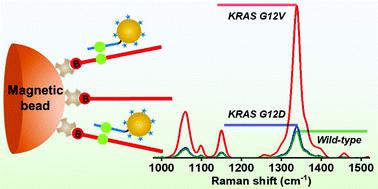Our official English website, www.x-mol.net, welcomes your
feedback! (Note: you will need to create a separate account there.)
Highly specific detection of KRAS single nucleotide polymorphism by asymmetric PCR/SERS assay
Analyst ( IF 3.6 ) Pub Date : 2021-08-14 , DOI: 10.1039/d1an01108a Nana Lyu 1 , Vinoth Kumar Rajendran 1 , Jun Li 2 , Alexander Engel 3, 4 , Mark P Molloy 2 , Yuling Wang 1
Analyst ( IF 3.6 ) Pub Date : 2021-08-14 , DOI: 10.1039/d1an01108a Nana Lyu 1 , Vinoth Kumar Rajendran 1 , Jun Li 2 , Alexander Engel 3, 4 , Mark P Molloy 2 , Yuling Wang 1
Affiliation

|
The molecular diagnosis of KRAS mutations has become crucial for clinical decision-making in colorectal cancer (CRC) treatments. Currently, the common methods for detecting mutations are based on quantitative PCR, DNA sequencing and droplet digital PCR (ddPCR), which require expensive specialized equipment and testing reagents. Herein, we propose a simple and specific strategy by integrating asymmetric PCR with surface-enhanced Raman spectroscopy (Asy-PCR/SERS) for the detection of KRAS G12V mutation, one of the most common driver mutations in CRC. To discriminate mutant targets from non-targets, Asy-PCR was applied to obtain single-stranded DNA (ssDNA) with unequal amounts of forward and reverse primers, subsequently, detection of the target mutant ssDNA amplicons was attempted by hybridization with Raman reporter-coded and allele-specific oligonucleotide-functionalized gold nanoparticles (SERS nanotags). The oligo encoding of the KRAS G12V mutant sequence could be identified by using a portable Raman spectrometer where the characteristic spectra of SERS nanotags indicate the presence of mutant targets. The Asy-PCR/SERS method showed high specificity and sensitivity for identifying as few as 0.1% mutant alleles of KRAS G12V mutation from non-target sequences. Using colorectal polyp biopsies, we demonstrated that Asy-PCR/SERS assay could distinguish KRAS G12V (c.35G > T) and KRAS G12D (c.35G > A) which occur at the same nucleotide location. As KRAS G12V is a driver oncogene in other cancers including lung, pancreatic, ovarian and endometrial cancers, the proposed assay shows great potential for application in additional tumor streams.
中文翻译:

通过不对称 PCR/SERS 分析高特异性检测 KRAS 单核苷酸多态性
KRAS 突变的分子诊断已成为结直肠癌 (CRC) 治疗临床决策的关键。目前,检测突变的常用方法是基于定量PCR、DNA测序和液滴数字PCR(ddPCR),这需要昂贵的专用设备和检测试剂。在此,我们提出了一种简单而具体的策略,通过将不对称 PCR 与表面增强拉曼光谱 (Asy-PCR/SERS) 相结合来检测 KRAS G12V 突变,这是 CRC 中最常见的驱动突变之一。为了区分突变靶标和非靶标,应用 Asy-PCR 获得单链 DNA (ssDNA) 和不等量的正向和反向引物,随后,通过与拉曼报告基因编码和等位基因特异性寡核苷酸功能化金纳米粒子(SERS 纳米标签)杂交,尝试检测目标突变 ssDNA 扩增子。KRAS G12V 突变序列的寡核苷酸编码可以通过使用便携式拉曼光谱仪进行鉴定,其中 SERS 纳米标签的特征光谱表明存在突变目标。Asy-PCR/SERS 方法显示出高特异性和灵敏度,可从非目标序列中识别少至 0.1% 的 KRAS G12V 突变突变等位基因。使用结直肠息肉活检,我们证明 Asy-PCR/SERS 测定可以区分发生在相同核苷酸位置的 KRAS G12V (c.35G > T) 和 KRAS G12D (c.35G > A)。由于 KRAS G12V 是其他癌症的驱动癌基因,包括肺癌、胰腺癌、卵巢癌和子宫内膜癌,
更新日期:2021-08-19
中文翻译:

通过不对称 PCR/SERS 分析高特异性检测 KRAS 单核苷酸多态性
KRAS 突变的分子诊断已成为结直肠癌 (CRC) 治疗临床决策的关键。目前,检测突变的常用方法是基于定量PCR、DNA测序和液滴数字PCR(ddPCR),这需要昂贵的专用设备和检测试剂。在此,我们提出了一种简单而具体的策略,通过将不对称 PCR 与表面增强拉曼光谱 (Asy-PCR/SERS) 相结合来检测 KRAS G12V 突变,这是 CRC 中最常见的驱动突变之一。为了区分突变靶标和非靶标,应用 Asy-PCR 获得单链 DNA (ssDNA) 和不等量的正向和反向引物,随后,通过与拉曼报告基因编码和等位基因特异性寡核苷酸功能化金纳米粒子(SERS 纳米标签)杂交,尝试检测目标突变 ssDNA 扩增子。KRAS G12V 突变序列的寡核苷酸编码可以通过使用便携式拉曼光谱仪进行鉴定,其中 SERS 纳米标签的特征光谱表明存在突变目标。Asy-PCR/SERS 方法显示出高特异性和灵敏度,可从非目标序列中识别少至 0.1% 的 KRAS G12V 突变突变等位基因。使用结直肠息肉活检,我们证明 Asy-PCR/SERS 测定可以区分发生在相同核苷酸位置的 KRAS G12V (c.35G > T) 和 KRAS G12D (c.35G > A)。由于 KRAS G12V 是其他癌症的驱动癌基因,包括肺癌、胰腺癌、卵巢癌和子宫内膜癌,











































 京公网安备 11010802027423号
京公网安备 11010802027423号